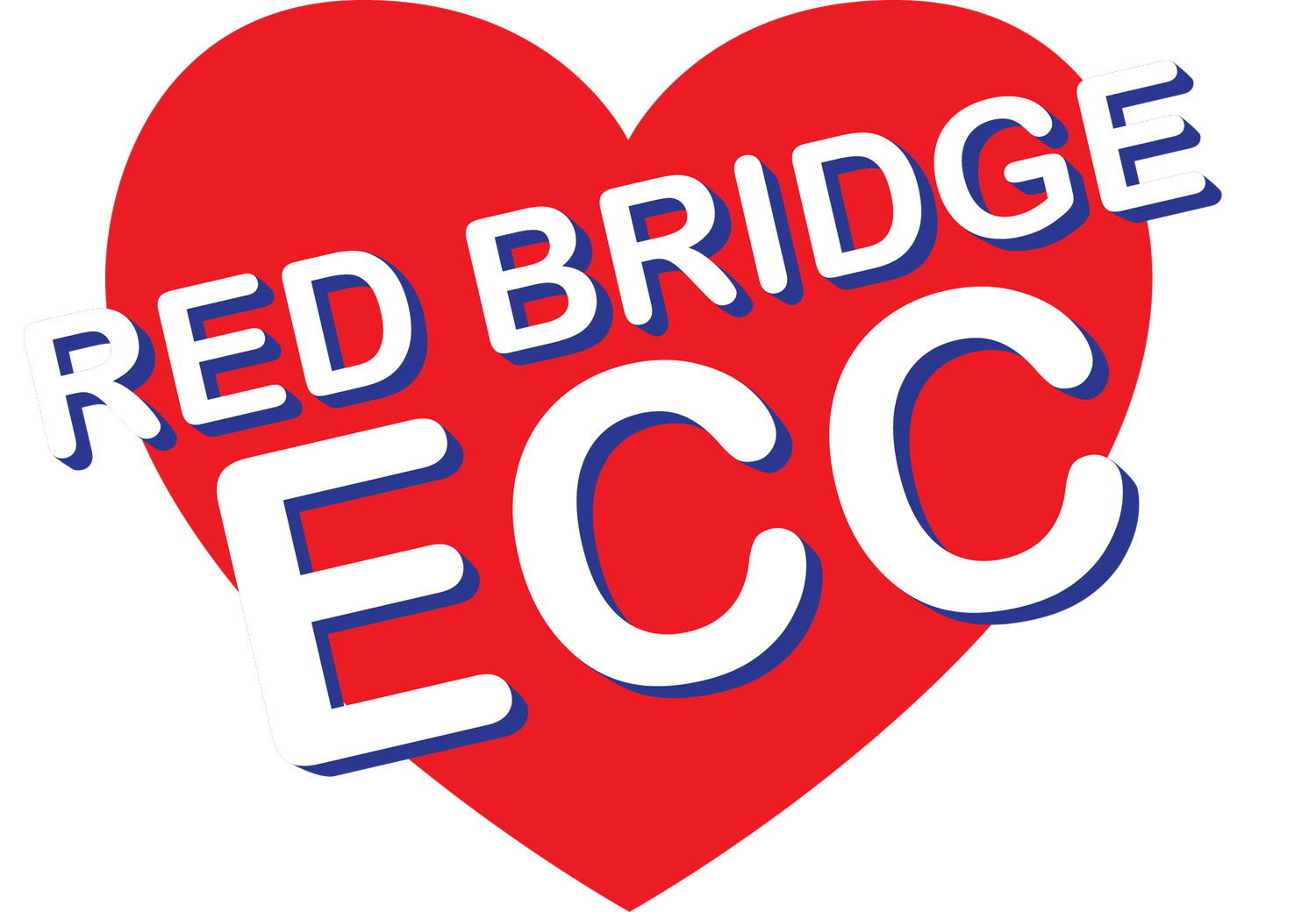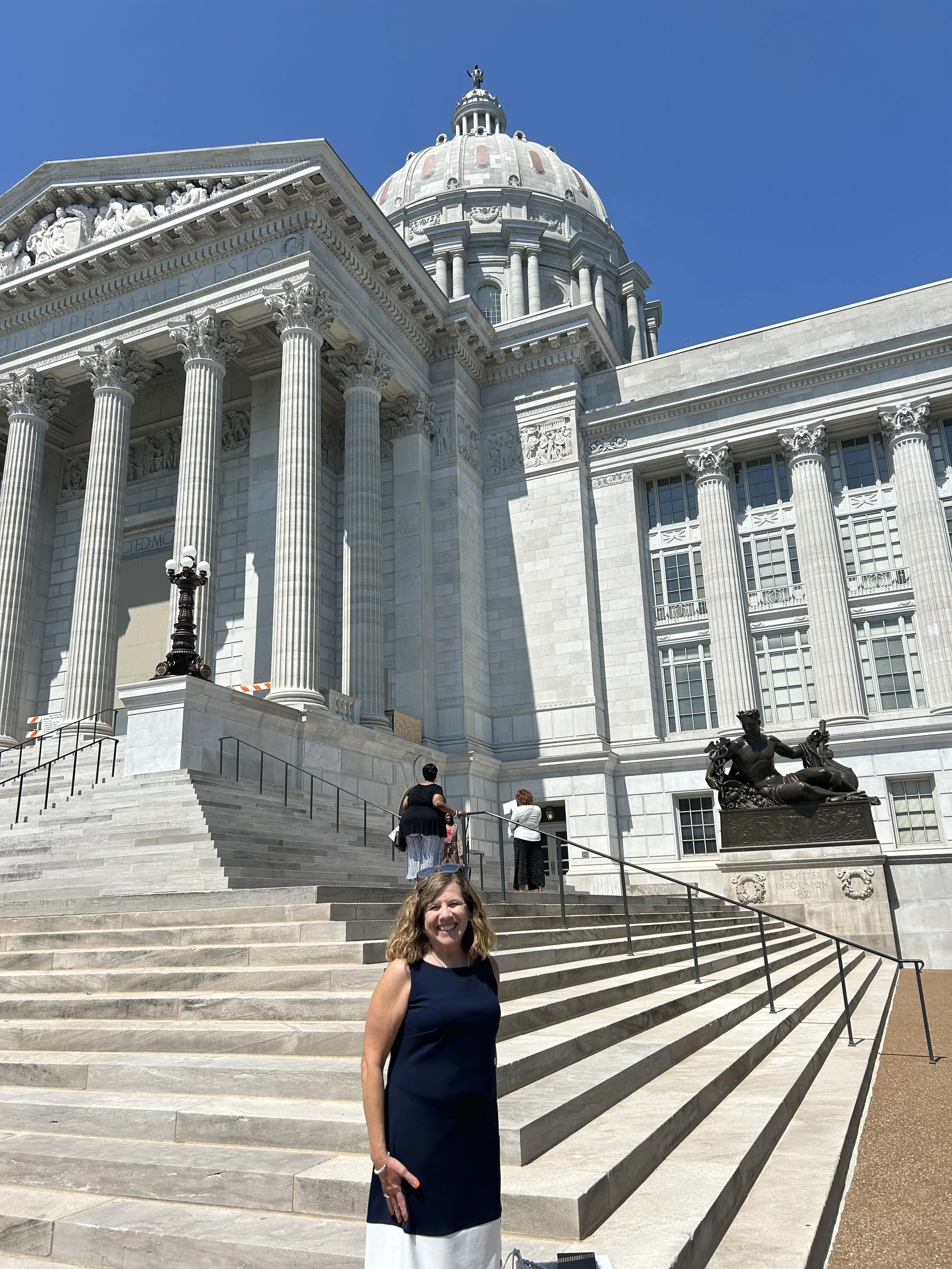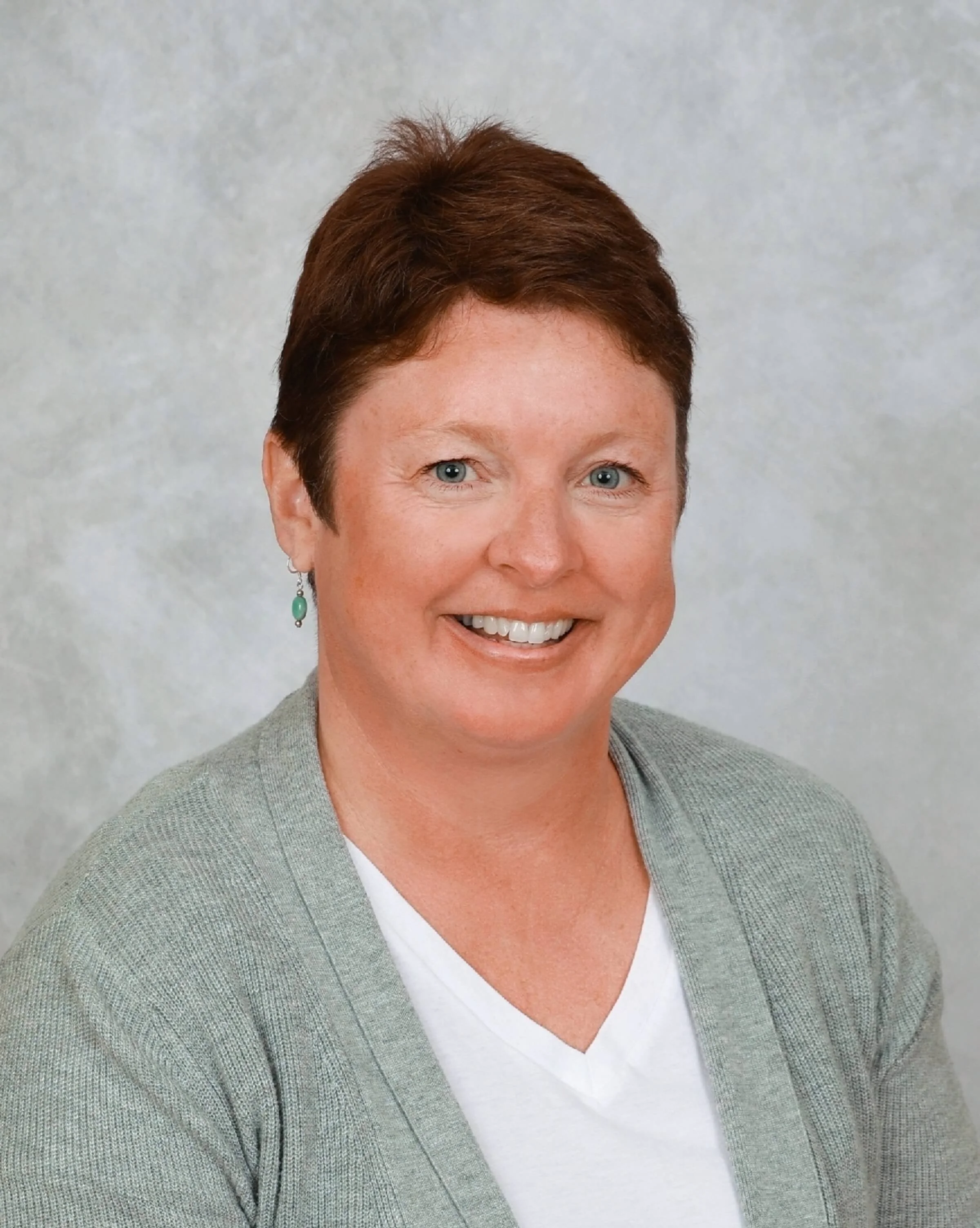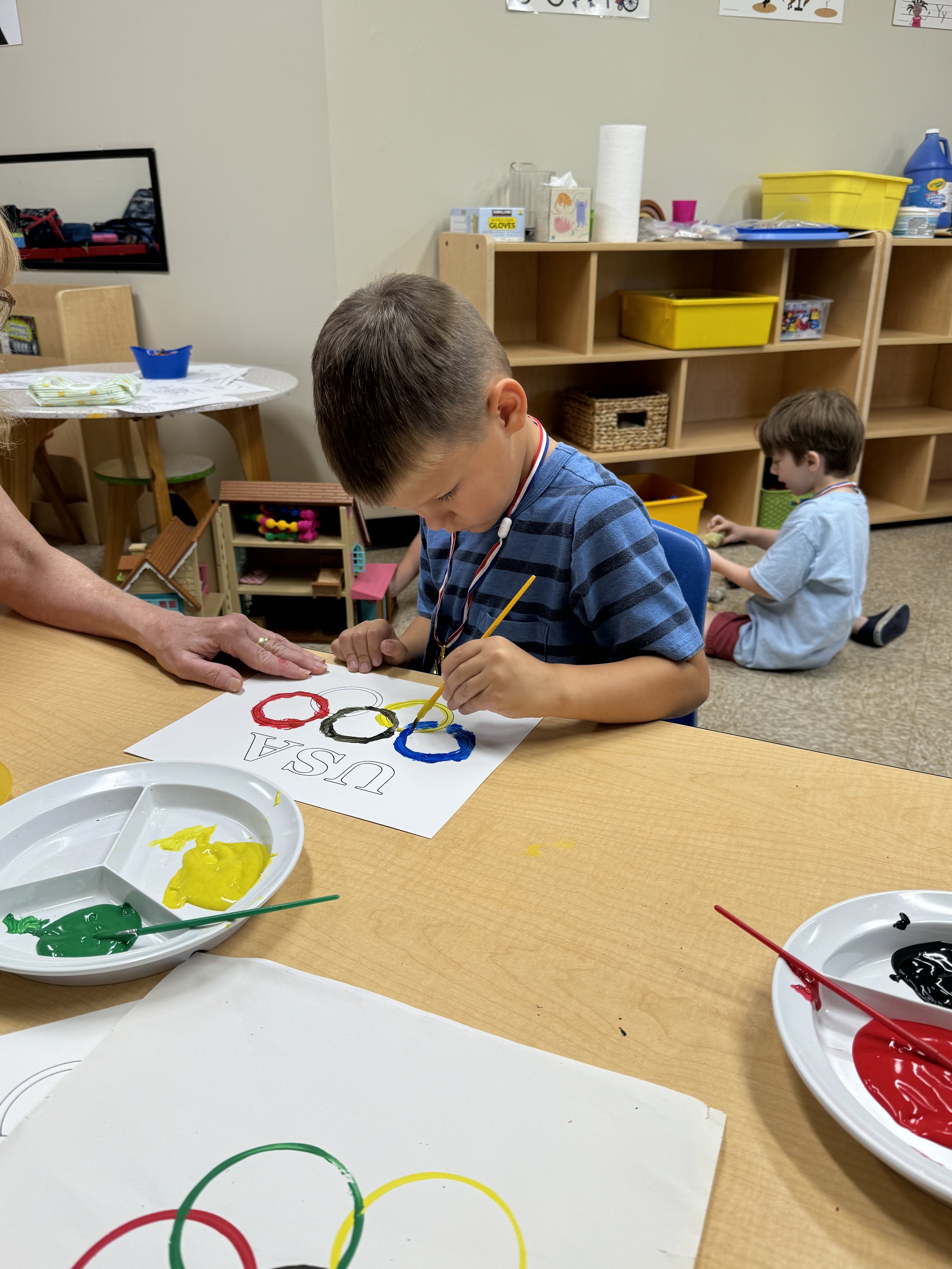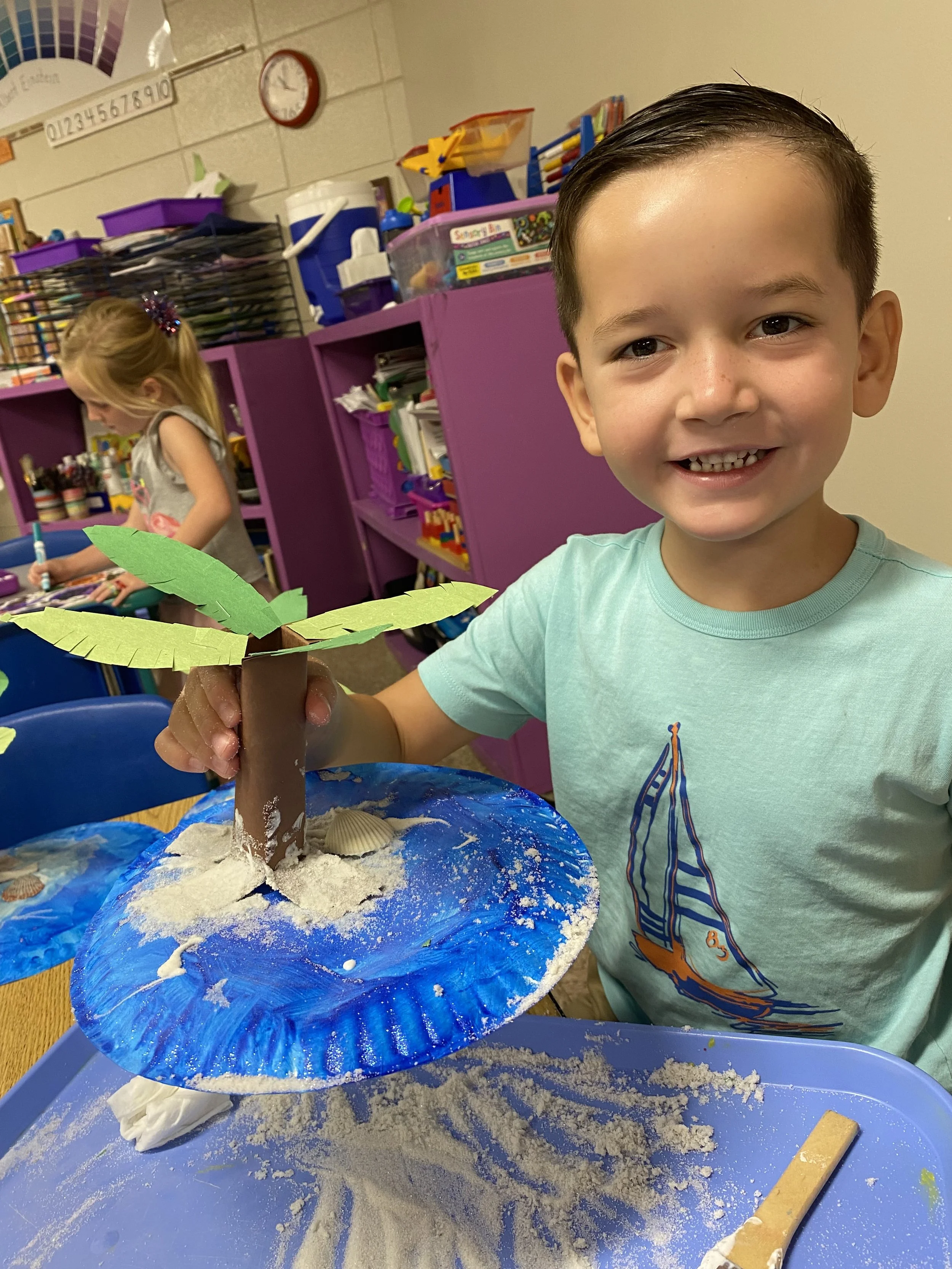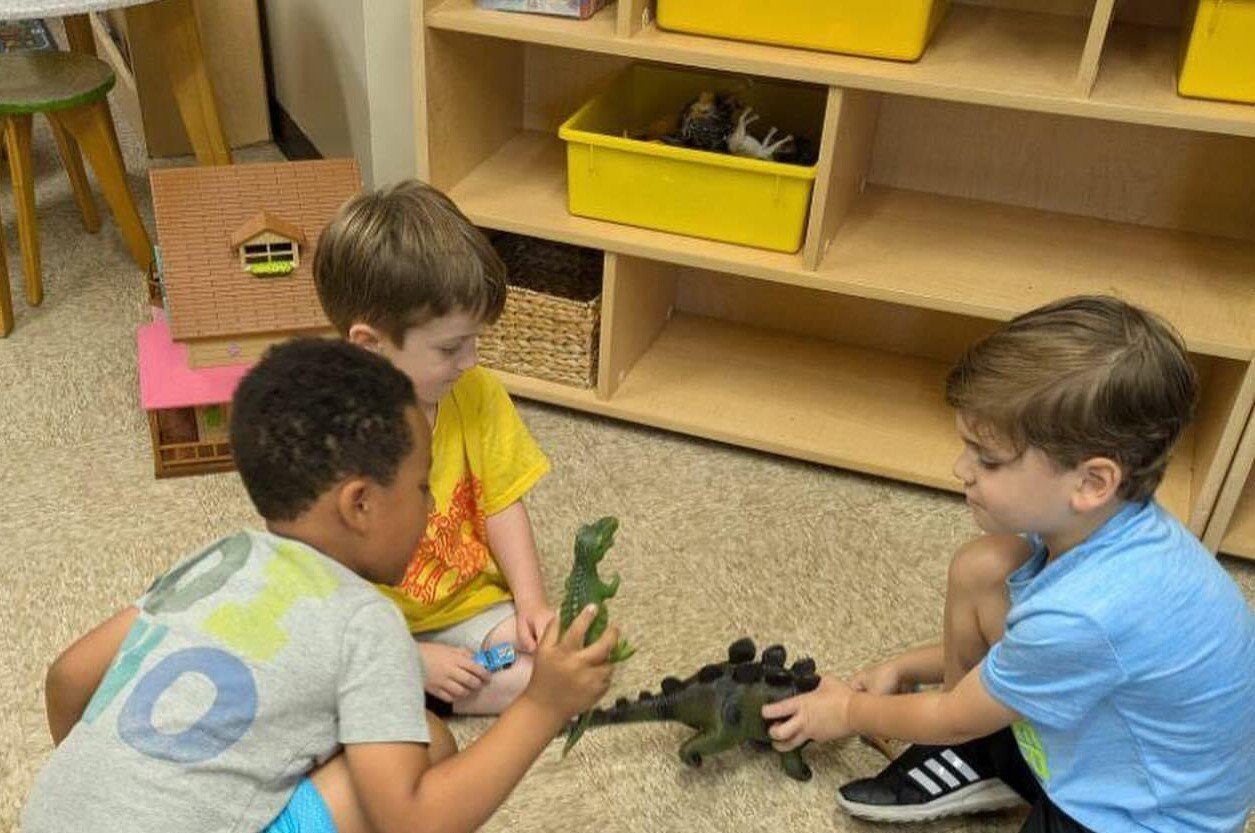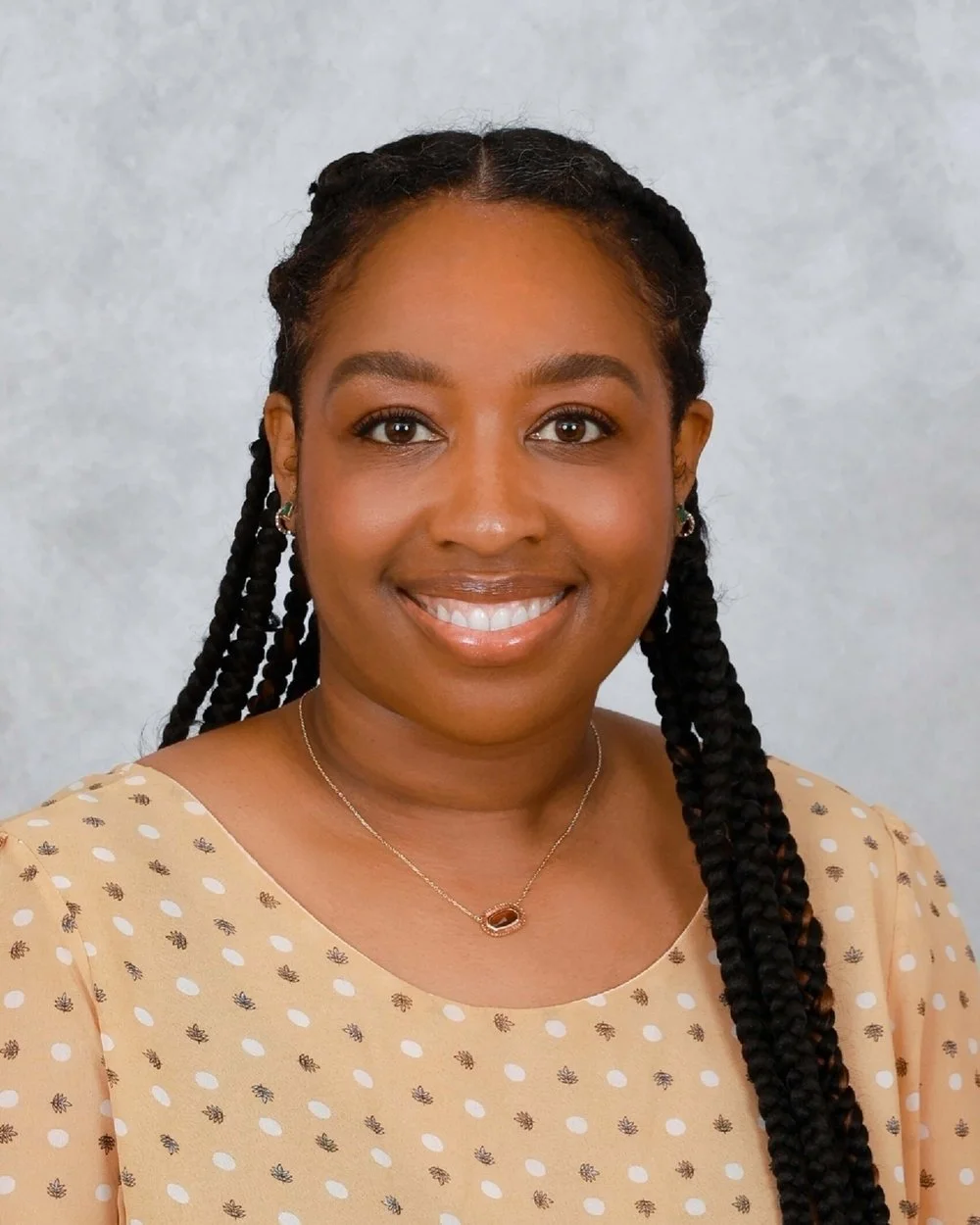
NEWS
ECC Participates in the MO-SECA Program
Last summer, I applied to a training program called MO-SECA (Missouri Supporting Early Childhood Administrators). It is part of the UMKC Institute for Human Development in their Early Childhood Innovation Center. This program focuses on building the knowledge, skills and connections for Early Childhood Administrators they need to lead and operate sustainable .
Taking ECC from Good to Great!
Leslie Shaw at the Missouri State Capital in Jefferson, MO.
Last summer, I applied to a training program called MO-SECA (Missouri Supporting Early Childhood Administrators). It is part of the UMKC Institute for Human Development in their Early Childhood Innovation Center. This program focuses on building the knowledge, skills and connections for Early Childhood Administrators they need to lead and operate sustainable .
As part of the program, I participated in 36 hours of training in the Leadership Academy and Business Academy. The trainings took place throughout the state of Missouri as well as at the Bloch Center at UMKC. I attended a series of classes focused on the book Building on Whole Leadership: Energizing and Strengthening Your Early Childhood Program. Other classes focused on developing my personal leadership style and organizational strengths. I studied topics like:
Supervision and HR
From Surviving to Thriving: Building a Sustainable EC Program
Understanding Financial Statements
Strategic Financial Management.
Every course offered insights and clear ways make improvements that benefited Red Bridge ECC.
In addition to the trainings, the program also included coaching sessions. I met my coach, Katie Diemler in August 2023. She came to the school for our sessions and saw the preschool and meet our teachers.
I participated in the “Program Administration Scale (PAS)” to measure Whole Leadership in an Early Childhood Center. This is an extensive survey of what our program is currently doing and areas that could be improved. It included things like:
Family and Community Partnerships,
Fiscal Management,
Staff Qualifications and
Relational Leadership
…and more.
We were assessed on a scale of 1-7. After the initial assessment, Katie and I looked for ways to improve the program and to increase the score. We revised our staff evaluation sheet I was currently using to include a self-assessment and to broaden the expectations for review. We created a “Getting to Know You” page for our parents and made plans for a “Back to School” Zoom call to improve communication and relationships with our families. We made many changes that allowed us to increase our PAS score in a number of categories. I was amazed at the impact these training sessions had on our program.
After completing the program, attendees were invited to a special recognition ceremony at the Missouri State Capitol in Jefferson City. There were over 150 administrators from across the state who completed the MO-SECA training program. To present our plaques, they had Dr. Michael Abel, Director of the Early Childhood Innovation Center, and Dr. Karla Eslinger, Commissioner of Education at the Department of Elementary and Secondary Education. The ceremony took place in the rotunda of the Capitol and included the MO-SECA trainers, coaches, staff along with friends and families of the administrators who completed the course. I feel honored to have participated in the MO-SECA training program. It was a great investment of my time and energy, and I can already see where this experience will benefit me, my staff and our families at Red Bridge Early Childhood Center. Let’s take ECC from good to GREAT!
Start your child in preschool at age 2
Did you know that your child can start preschool at Red Bridge Early Childhood center at 2 years old? Some parents might think this age is too young for preschool, but it’s a wonderful age to start.
Why Preschool at Age 2?
Did you know your child can start preschool at Red Bridge Early Childhood center at 2 years old? Some parents might think this age is too young for preschool, but it’s a wonderful age to start. Below are 6 reasons to start preschool at 2 years old.
Support. At Red Bridge Early Childhood Center, our priority is to teach children that they are safe, cared for and supported. For many of the students this is their first time away from their caregivers. Children learn that the teachers will take care of them and that their parents will return.
Time. While they don’t understand the concept of time at this age, we often tell our students “Mommy will be back at 1:00.”, so the children begin to learn that they can have fun at school until their caregivers return.
Socialization. Another reason to start your child in preschool at the age of 2 is to help with socialization. Learning how to make friends, be part of a group, and work together are lifelong skills your 2 year old will learn. Throughout the preschool day, children work on sharing, language skills, playing with others, and more. Not only are they learning to socialize with children their age, but they get to interact with older kids at recess, music and more. As you can imagine, seeing the “big kids” is cool when you’re little! They also learn how to interact with teachers and other adults.
Routine. Most children love a routine and thrive with that consistency. At preschool, they learn the rhythm of the day including circle time, recess, lunch time, music, Gym Jam, class, etc. While there are occasions when our schedule might change, we aim to be consistent so students know what to expect each day. This helps them feel safe and confident.
Independence. At Red Bridge Early Childhood Center, we encourage independence on day one of preschool. Two-year-olds are very capable and thrive in preschool settings. For example, putting away lunch and water bottles at the start of each day, placing backpacks in their own cubbies, opening their lunchbox at lunch time, cleaning up after lunch and more. They take pride in their independence as they figure out how to manage things on their own in the classroom.
Fun! In our 2’s classes we want them to have fun!!! We want their very first school experience to be one of fun, safety, growing and learning. We love our job and getting to know the children throughout the school year. It’s so fun to see them grow physically, emotionally and in so many other ways.
Interested in enrolling your 2 year old at Red Bridge Early Childhood Center? Call today!
Week 6 Camp ECC goes to the Olympics!
Camp ECC raced through week 6 with exciting Olympic-themed crafts and activities!
Camp ECC raced through week 6 with exciting Olympic-themed crafts and activities!
We started the week discussing the sports that are a part of the summer Olympics. The students shared their favorite events they would like to participate in if they were to attend the Olympics.
Campers made gold medals and paper plate laurel wreaths with leaves glued on top. They also made their own torch out of paper hand-prints to carry in the opening ceremonies. Some classes made a Team USA windsock to hang in their rooms at home!
The students also decorated picture frames with red, white and blue stickers and dot markers. They took a picture on an Olympic podium with a USA flag in the background. They wore their medals, held up their torches and wore their laurel wreaths.
We set up obstacle courses to create our own track and field events. We even made our own hurdles with solo cups and paper tubes.
In music class, the kids paraded around the gym to the Olympic theme song. We also danced to the song “Party in the USA.” Our sensory bins were full of red and blue bracelets, stars, and rings that they could wear during the day. We celebrated the end of the week with Red, White and Blue bomb pops!
As camp ECC 2024 ends, we hope the kids had an exciting, positive, experience! We look forward to the 2025 camp! Enrollment is currently open for the 2024/2025 school year. Click here to learn more about fall 2024 enrollment!
Child paints USA themed Olympic Rings
ECC Summer Camp Recap Week 5: Surfs Up!
Beach vibes were felt throughout the week at our Surfin’ USA camp! This week was full of beachy fun like sand tables, surf boards, and seashells.
Beach vibes were felt throughout the week at our Surfin’ USA camp! This week was full of beachy fun like sand tables, surf boards, and seashells.
In music class, we had fun dancing to “Surfin’ USA”, marching to the song “Red, White and Blue”, jumping up and down for the song “Firework” and singing to “Mr. Sun” and “Baby Shark.” Miss Jennifer makes our music program so lively and fun.
Many campers got to make their own surfboards out of paper plates or foam board. They decorated the surfboards using a combination of paint and shaving cream. You swirl the paint and shaving cream together, press the surfboard on top and then scrape off the excess paint to reveal the patterns. They turned out so bright and colorful! The teachers took pictures of them pretending to surf and then cut those out and glued them to the boards.
For an activity, students studied various seashells using magnifying glasses. There are so many features that make each shell unique. We also put the shells in water to see if they would sink or float.
We ended the week with some delicious red, white and blue Bomb Pop popsicles!
Bluey visits ECC Summer camp!
We had so much fun with our Bluey and Bingo camp this week!
We had so much fun with our Bluey and Bingo camp this week! Campers know and love the show and we brought it to life at ECC with all of the games, activities, projects and songs that went with the Bluey theme!
Students could choose to be Bluey or Bingo when they made headbands out of construction paper. They even had the cute bushy eyebrows just like the characters. We played a bunch of games including “Keepy Uppy” using blue and yellow balloons and paddles. We played “Pass the Parsel” and “Bluey/Bingo Cornhole.” We also did a scavenger hunt throughout the building finding clues which eventually lead us back to the classroom for Bluey fruit snacks.
In music class, we danced and sang songs like “B-I-N-G-O”, “The Wheels on the Taxi”, “Little Blue Wagon” and the theme song to Bluey. We had lots of Bluey books that Miss Tina picked up from the Red Bridge Library including Baby Race, Barky Boats, Queens, and Sleepytime.
Our best surprise was a special visit from Bluey herself! She came before camp so parents could take pictures with her in front of the school. Then, she walked around to each classroom to take a class picture with the students. A HUGE THANK YOU to Tiffany Kim from My Play Cafe for being our Bluey guest of honor this week. The students loved it!
ECC Summer Camp Recap Week 3: Diggin' Dinos
Stomp! Stomp! Stomp! ECC campers had a roaring good time learning about dinosaurs during dinosaur week!
Stomp! Stomp! Stomp! ECC campers had a roaring good time learning about dinosaurs this week.
We pretended to be Paleontologists and “discovered” fossils. Campers made their own fossils out of air clay or salt dough that was dried and baked in the oven. They used miniature dinosaurs and leaves to create the impression in the dough. They loved making their own fossils.
Campers were busy in the classrooms with all sorts of Dino activities! Some made Dinosaur hats, and others made Dinosaur feet which were good for stomping. Some students built Triceratops out of paper plates using brads to attach the head, tail and legs. The kinetic sand with the plastic dinosaurs was lots of fun for sensory play in the classrooms.
Miss Kate set up a dinosaur obstacle course where students could stomp like a T-Rex, stand tall like a Brontosaurus, crawl like a Brachiosaurus and play Tricera-Toss. The children loved the challenges and took several turns through the course. We set it up in the hallway so campers could be inside and get a break from the heat.
In music class, we sang “The Dino-Pokey”, “Three Dinosaurs Go Out to Play”, and “We are the Dinosaurs.” Miss Jennifer adapted one of our favorite songs to “I’m Bringing Home a Baby Dinosaur.” And we always love to sing the “S’Mores Song!”
Teachers read books about Dinosaurs including How do Dinosaurs Learn to be Kind, Dinosaurs Fun Facts, and Dazzle the Dinosaur.
Happiness is a week at Camp ECC with lots of learning, play and fun!
ECC Summer Camp Recap Week 2 - June 11-13
There is so much to learn when you take time to explore the world around you!
It was a beautiful week to be outside and exploring nature! The ECC campers put on their “looking glasses” and discovered so many things in the great outdoors. We went on a nature themed scavenger hunt and searched for caterpillars, birds, spider webs, small leaves and more.
They made nature bracelets out of packing tape, collected sticks, dandelions, blades of grass, and more. Some classes made nature suncatchers filled with petals, leaves, seeds, stems, and other things the teachers collected. They were proud of their new creations.
Other classes made butterflies using watercolors, markers and coffee filters. The teachers added a picture of each student as a beautiful butterfly, while other classes painted pots and planted flowers. We also did leaf rubbings to see the delicate veins that go throughout the leaves.
The students read books about nature like Secrets of the Forest and Does Earth Feel? We learned about different animals who live in the forest, including what they eat and/or what makes them unique.
In music class, we sang the songs “Going on a Bear Hunt”, “Ants in my Pants”, “Five Green and Speckled Frogs”, and “I’m Bringing Home a Baby Bumblebee.” “The S’More Song” is always a favorite the students love too!
There is so much to learn when you take time to explore the world around you!
ECC Summer Camp Recap Week 1
The first week of summer camp was out of this world!
3-2-1 BLAST OFF! The first week of camp was out of this world! There is so much to learn about our solar system, the stars, the sun, and the planets. The students loved it!
When walking into a classroom, children had a variety of activities to participate in.
In Green Squares, the students played a game of “Moon rock, moon rock, where did you go?”, making rocket ships that could be launched with a straw. Some were made of cardboard and aluminum foil.
In Gold Stars, they used moon sand at a sensory table and made stars.
In music class, we sang songs like “Mr. Golden Sun”, “Twinkle, Twinkle Little Star” and “5 Little Astronauts.” In the song, “Bop Until You Drop” the children moved in slow motion pretending we were walking on the moon with no gravity.
We read books about outer space like “Billie’s Outer Space Adventure”, “Little Kids First Word Book of Space” and “Fly Guy Presents Space.” We took pictures of ourselves wearing space suits and imagined what it would be like to travel on a rocket ship and visit the moon. Students learned about different planets and what characteristics make them unique. They also created their own planets using watercolors, shaving cream, paint, glitter, and coffee filters. We even invented names for our new planets!
We ended the week with a sweet Bomb Pop Popsicle treat!
How to foster independence in children
Fostering independence in children brings numerous benefits that positively impacts their overall development.
In today's fast-paced world, it is crucial to equip children with the necessary skills to become independent and self-reliant individuals. Fostering independence in children not only empowers them to take charge of their lives, but it also sets them on a path towards success and personal growth. Teaching self-help skills from an early age is an invaluable investment in their future. This blog will explore the importance of fostering independence and providing children with self-help skills, and practical tips on how to achieve these goals.
Fostering independence in children brings numerous benefits that positively impact their overall development. By encouraging independence, we promote self-confidence, decision-making abilities, and problem-solving skills. Independent children tend to be more resilient, adaptable, and have a stronger sense of responsibility. They are more likely to set and achieve goals, develop leadership qualities, and have a greater sense of self-worth.
A fundamental aspect of independence is teaching children self-care skills. This includes basic tasks such as dressing, grooming, and personal hygiene. By gradually introducing these skills and providing guidance, children learn to take care of their bodies and develop a sense of pride in their appearance.
Assigning age-appropriate household chores teaches children responsibility and instills a sense of ownership and contribution to the family. Tasks like setting the table, tidying up their rooms, or helping with meal preparation develops their organizational skills, time management, and a strong work ethic.
Encouraging children to solve problems independently enhances their critical thinking abilities and builds resilience. Instead of immediately providing solutions, parents can guide them through the process of identifying problems, brainstorming possible solutions, and evaluating the outcomes. Asking questions such as “What are you going to do?”, can help jump start the child’s thinking process. When parents resist the urge to “rescue”, this empowers children to think analytically and find creative solutions to challenges they encounter.
Allowing children to make age-appropriate decisions enables them to develop decision-making skills. From choosing their outfits to deciding on extracurricular activities, giving children the opportunity to make choices fosters independence and confidence. It teaches them to weigh options, consider consequences, and take responsibility for their decisions. However, be sure the choices and/or options are ones that you are okay with following through.
To help children gain independent skills, start by:
providing support and guidance
gradually allowing children to take on more responsibility.
The gradual introduction of responsibility ensures that children feel supported while gaining confidence in their abilities.
Acknowledge and praise children's efforts and achievements, no matter how small. Positive reinforcement motivates them to continue developing their independence and self-help skills.
Set age-appropriate expectations and goals, ensuring they are realistic and achievable. This prevents overwhelming children and allows them to experience success in their independent endeavors.
Fostering independence requires patience and persistence. Children may make mistakes or require additional support along the way. It is essential to provide a safe and non-judgmental environment where they can learn from their experiences and grow.
Fostering independence and teaching self-help skills to children is a vital aspect of their overall development. By empowering children to take charge of their lives, we equip them with the tools necessary for success and personal growth. Through self-care skills, household chores, problem-solving, and decision-making skills, children learn to become resilient, responsible, and self-confident individuals. As parents and caregivers, it is our responsibility to provide the guidance, support, and opportunities necessary for children to develop these life skills. By doing so, we pave the way for their future success and happiness.
Strengthening Communication with Parent-Teacher Partnerships
We strive to communicate openly and clearly to parents about their children. It could be something like your child being chosen to be the line leader or performing a task independently, we love to share these wins with the parents to help build that trust.
At Red Bridge Early Childhood Center, we know the importance of fostering a relationship between parents and teachers. Having a good relationship helps teachers empathize with the parents and children. It helps teachers understand things that are happening at home that may impact your child’s performance in school.
For example, let’s say there was a rough drop off in the morning. Your child doesn’t sleep well, a parent is out of town, or a grandparent visits. These could impact your child’s routine and their behavior, mood, and more.
There could also be more serious things going on at home impacting your child. Having a relationship built on trust could help inform how the teacher should care for the child; it can also help the teacher share resources and other information that could help the parents through a difficult time.
We strive to communicate openly and clearly to parents about their children. It could be something like your child being chosen to be the line leader or performing a task independently, we love to share these wins with the parents to help build that trust.
Make it stand out
We strive to communicate openly and clearly to parents about their children. It could be something like your child being chosen to be the line leader or performing a task independently, we love to share these wins with the parents to help build that trust. - Leslie Shaw
We love to share things that happen at school that help a parent to gain insight into their child’s day. It could be something small like being chosen to be the line leader or independently unpacking their backpack. It could be one of those moments a teacher notices where your child was a good friend to another child who was having a hard day. Or it could be significant information about your child’s behavior or concerns a teacher may have about your child’s development. Regardless, we know that when teachers and parents work together as a team and share open communication, your child will benefit from this partnership.
What are some other ways that parents and teachers can build trust with one another? Comment below!
